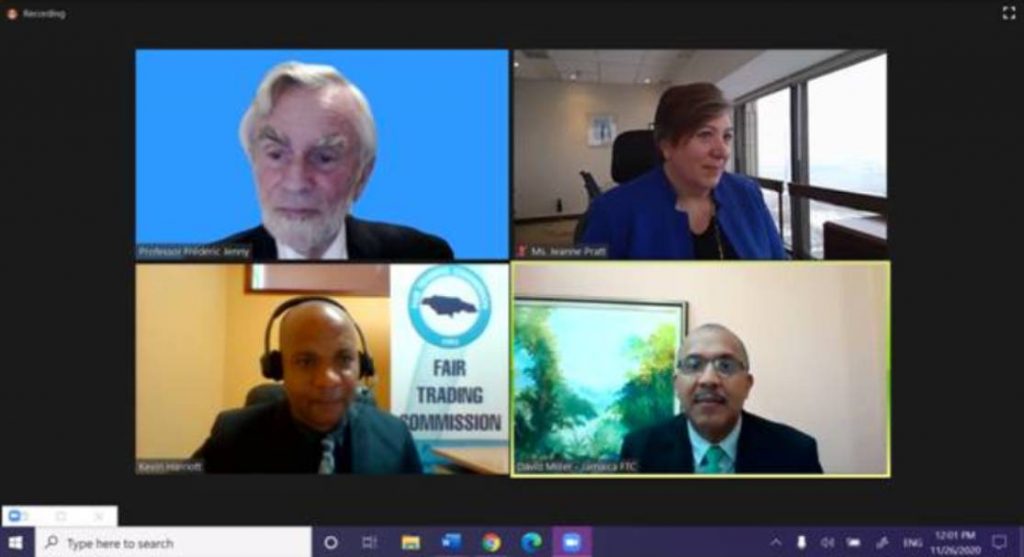
The FTC hosted the 18th Annual Shirley Playfair Lecture in November 2020 under the theme “Protecting Competitive Markets and Consumer Welfare during and Post COVID-19 Pandemic.” By way of a panel discussion, the lecture highlighted the range of measures implemented by competition authorities in response to the perceived threat posed by the pandemic. It also addressed the relevance of competition law to the protection of consumer welfare. In painting a picture of the effect of the pandemic, one of the issues raised by the panel offered a fresh perspective on the age-old intellectual debate governing conflicts between competition policy, industrial policy, and international trade policy as it relates to the role of the State in safeguarding consumer welfare.
The Lecture benefited from the insights of a panel discussion comprising Professor Frédéric Jenny, Chairman of the Competition Committee at the Organisation for Economic Cooperation and Development (OECD) and Jeanne Pratt, Senior Deputy Commissioner at the Competition Bureau in Canada. Kevin Harriott, Competition Bureau Chief of the FTC, moderated the discussion.
The panel engaged the audience on issues on how competition authorities have been adjusting enforcement activities in response to the pandemic. Professor Jenny highlighted general changes observed throughout the globe while Ms. Pratt provided detailed commentary on Canada’s experience. The panel revealed a wide range of responses within the international community of competition authorities. At one extreme, some competition authorities relied on existing legislation to respond to the pandemic. At the other extreme, some jurisdictions (including Jamaica) introduced or amended legislation to deal with the realities (such as price gouging) occasioned by COVID-19. Other authorities adopted a moderate response and became more accommodating of some activities especially as it relates to cooperation among competing firms. The panel mentioned that competition authorities with a consumer protection mandate were generally the ones which acted to control prices. Indeed, Senior Deputy Commissioner Pratt informed the audience that while the Competition Bureau did not make any adjustment to its activities, the consumer protection agency in Canada addressed consumer welfare issues as they arose.
Another critical issue tackled by the panel was the relevance of competition law to the protection of consumer welfare. The panel acknowledged that the market may be slow in adjusting to correct the problems raised by COVID-19. It warned, however, that while some measures by the State to intervene in the market process may be justified to protect consumer welfare in the short run, competition in markets- and by extension competition enforcement, was still the best means of protecting consumer welfare in the long run and therefore policymakers should be mindful of sacrificing long term benefits for short term gains.
The panel pointed out that the impact of the pandemic differed across sectors as it paralyzed some sectors and seemingly catalysed others. It was pointed out that sectors such as oil, tourism & travel as well as the Micro, Small to Medium Size (MSME) sector were adversely impacted by the pandemic while e-commerce seemed to have flourished with Tech giants such as Amazon, Apple, Google Microsoft and Facebook reporting significant increases in revenues during the pandemic.
The panel noted also that one of the legacies of the pandemic was the digital transformation of many retail markets such as food delivery. The increased prominence of the digital economies poses a significant challenge for competition law enforcement going forward. For example, market definition analysis may become significantly more complex with multisided platforms operators competing across multiple markets and the increasing prominence of non-price factors such as access to big data and related consumer privacy issues in competition law analyses.
Regarding the state of markets in the aftermath of COVID-19, the panel conjectured that economic recovery would require leadership to some degree from the State. It was suggested that among other things, the push toward a global supply chain might be retarded in favour of a more regional supply chain. It was also suggested that the world should revisit the intellectual discussion on the role of the State in ‘picking winners’ with the renewed concept of coordination among competition policy, industrial policy and international trade policy in which competition practitioners set the parameters in which the State could lead the economic recovery process.
The historic virtual staging thoroughly engaged the audience comprising local and regional individuals from diverse professional backgrounds. In the Q&A session, the audience extracted even deeper analyses from the panel. By all accounts, the Lecture promised and delivered a smorgasbord of food for thought on the cause and likely consequences of COVID-19.
SPL Closing Remarks by David Miller
